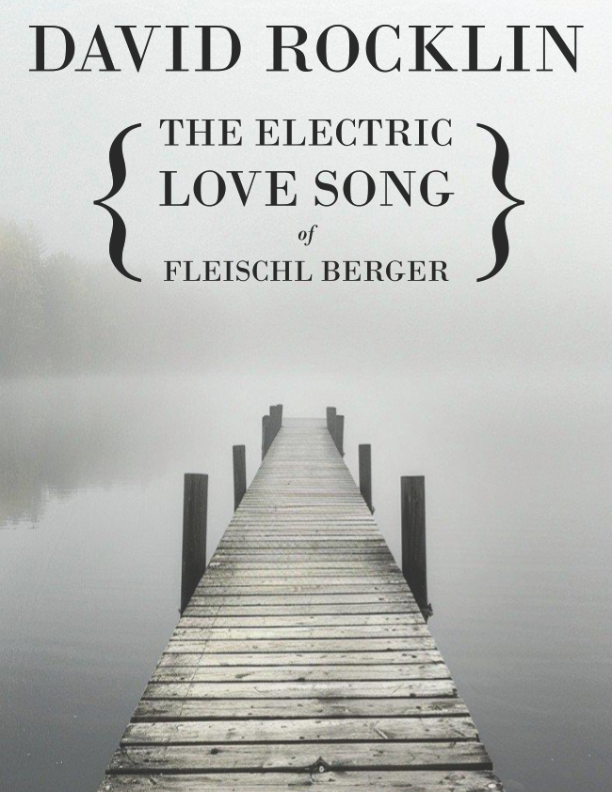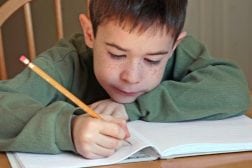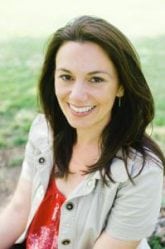
On Sunset Boulevard in Echo Park, there’s a little storefront you’d miss if you weren’t looking for it. Its sign reads “The Echo Park Time Travel Mart,” and while it does stock UFO stickers, levitating moon lamps and rocket ship patches, it’s actually the eastside home of 826 L.A., a non-profit writing and tutoring organization. 826 L.A. has served local youth since 2005, but adult writers gather here, too, and David Rocklin is among them.
Though he grew up in and around Chicago, Rocklin has called Los Angeles home for years now, and he’s raised his two daughters here as well. I recently spoke to him about his work, parenting in these times and how his monthly reading series, “Roar Shack” (which takes place at Time Travel Mart), continues to help build and support a local community of writers.
What is one of your earliest memories of being a writer?
In grade school, I had an English teacher named Mrs. Luxembourg. I vividly remember that one day she assigned me some extra reading. I took the short story home, and I was just undone when I read it. It was Shirley Jackson’s “The Lottery.”
Looking back, it was one of the earliest pieces I read that showed me how powerful writing can be, and how subversive it can be. I went back to Mrs. Luxembourg and went on and on about the story, and she told me that she gave it to me knowing she’d see my name in print one day. And it was a seminal moment for me. It meant a lot to me that somebody saw a writer in me long before I saw a writer in myself. This was 3rd or 4th grade. She gets thanked in every acknowledgement section of every novel I’ve been lucky enough to publish.
How did you make it out to L.A.?
One of my close childhood friends always wanted to be a director. He found resonance in comedy and human drama, while I found resonance in horror films and martial arts films. When he graduated from NYU, he moved to L.A. to pursue directing, and the first film he got a chance to direct was a vampire kung fu movie, which I found hysterical. He’d call me from Thailand, where he was shooting, to ask about roundhouse kicks and what they look like. At around that point, I was in Chicago and toying with the idea of writing; it took me a while to turn fully toward it. But my friend invited me to L.A. to write screenplays together. I threw everything I owned in the back of my car, drove to L.A. and had some adventures along the way. We wrote four scripts together, one of which was optioned. But during that process, I learned that that was not the kind of writing I wanted to do.
And you turned to stories. You have two novels out, and a third arrives this summer. What can you tell us about this new novel?
It’s called “The Electric Love Song of Fleischl Berger” and it is heavily fictionalized but based on a moment in the life of an actual person. It’s a moment that’s lost, a life no one knows. I seem to take great pleasure and care in excavating these moments and then creating a story around them, sort of giving someone a life they didn’t get to live.
This book stemmed from an article about a near-death experience. There was a footnote, and I followed it down a rabbit hole, [discovering] a German gentleman born before the turn of the 20th century, who, in his 18th year, had an unexplainable near-death experience that he spent the rest of his life trying to prove. That takes the characters through the silent film era, through the first world war, to the eve of the second world war. It’s really about [wanting to know] if the love of his life truly experienced this with him or not. And what does it mean if she did, and what does it mean if she did not? And it’s about hearing those who have passed and living in the shadow of people who are no longer with you.
In addition to writing your own work, you guide fellow writers via your Roar Shack reading series, as well as other programs. Can you tell us a bit about this work?
Whether in a retreat setting, one-on-one or in a group, I always talk about permission, because one of the things that stopped me from beginning to write was the thought that I wasn’t worthy. I didn’t come up in an MFA [master of fine arts] program, and so, I didn’t feel like this was something I could do — it was something other people do. The process of giving yourself permission, of saying, “My way may not be Walter Mosley’s way or Ann Wright’s way or John Irving’s way, but there’s room for me, too.” If your way allows you to find your way in and out of a story and develop it, maybe it’s worthy. And then it’s a question of making the book as good as you can.
And to that end, my reading series, Roar Shack, has been running for about 10 years in L.A. It really stemmed from my tour for my first book; that was the first time I’d been in the company of other writers on an extended basis, and I missed it. I missed talking with other people who get it. So, Roar Shack was born from that, and everybody is invited — published or unpublished. I’ve had people create things on the fly that they go on to publish, which is the coolest thing. It’s the third Sunday of each month, and I mostly advertise it on Facebook. There are five featured writers each month, and at every show we also do a “live write,” or an on-the-spot writing improv game, and the winner comes back the next month as a featured writer.
Work with writers one-on-one has become a really treasured part of the whole writing experience. Right now, I’m working with a writer with a story collection, another with a memoir and another with book-length fiction. And I lead retreats as well, where we bounce ideas, brainstorm, and I hope to give participants a perspective on their work that they don’t see themselves, because we are so close to our own work that it’s hard to see sometimes.
You nurture all of these writers, and you are a parent. Your daughters are now 16 and 24. Let’s talk about parenting.
In the context of parenting while writing, that is a challenge, no question. And then parenting while in Southern California is quite an obstacle course. We’re trying to support a developing sense of self while up against everything from social media to entitlement. Fellow parents and I talk about how, at a certain point, you don’t have control. They’re going to step out into that world, and all you can do is hope that you’ve given them everything you can possibly give them to be OK out there. It’s a mine field.
Every day, you just try to be as grateful as you can for the time to be there for them and make them feel safe and secure.
Any suggestions for readers who are working on writing themselves? Do you think anyone can be a writer?
Like anything, there are some of us who may simply be a little more naturally inclined to this form of expression, while others of us will have put in the butt-in-seat work. The earliest way the world is rendered to us is through stories — the result of questions like “How was I born?” or “When did we move to this house?” or “Why is the sky blue?”
We all know how to hold a pen. We know how to type on a keyboard, so it feels like it’s the most accessible way to express yourself. Then you sit down and you find out that it’s every bit as demanding as any other form of expression. But we all feel the need to do it — we all fall in love, we all lose someone, and expression is how we make sense of it. In that way, anybody who wants to make sense of the world through writing is a writer. It’s available to anyone, if they put the time in. And if people approach writing in even a semi-regular way, they’re going to see something happen.
Find Rocklin and his work at davidrocklinauthor.com.






























